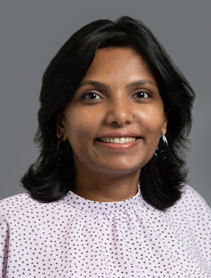
Dr. Prerna Jasmine Masih
- Position: Assistant Professor
- Department: Biology
- Office Location: Building 58, Room 62F
- pmasih@uwf.edu
- Campus: 850.474.3119
Biography
Dr. Prerna Masih is an Assistant Professor in the Department of Biology, specializing in biochemistry and cell biology. Dr. Masih's research at UWF focuses on the development of novel therapeutic agents. Her interdisciplinary research includes exploring organic molecules for their interesting biological therapeutic activity such as antibacterial, antifungal, anti-inflammatory, and anticancer. She uses tools from diverse areas including microbiology, biochemistry, structural biology, pharmacology, cell biology, organic chemistry, and computational biology to investigate her research questions. She is interested in the understanding mode of action of novel therapeutic agents. Dr. Masih earned her B.S. (Chemistry) from St. Stephen’s College (Delhi University), India, and M.S. (Biotechnology) from the Indian Institute of Technology (I.I.T.) Bombay, India. She earned her Ph.D. in molecular and cellular biology at Roswell Park Cancer Institute, State University of New York (SUNY), Buffalo. During her doctoral studies, she investigated the role of DNA replication in mismatch repair. Thereafter, Dr. Masih continued her postdoctoral studies at the National Institutes of Health (NIH), Bethesda where she studied the biochemical properties of purified mismatch repair proteins. She has also worked at a biopharmaceutical company (New Link Genetics) as a Scientist where her research was focused on developing, and commercializing novel immuno-oncology biologics, including whole-cell cancer vaccines. Her research work has been published in peer-reviewed journals, such as Nucleic Acid Research, Pharmaceuticals and Journal of Organic Chemistry.
Degrees & Institutions
- Postdoctoral Fellow, National Institutes of Health (NIH), Bethesda, MD
- Ph.D. (Cellular and Molecular Biology), Roswell Park Cancer Institute, SUNY at Buffalo, NY
- M.S. Biotechnology, Indian Institute of Technology, Bombay, India
- B.S. Chemistry, St. Stephens College, Delhi University, Delhi, India
Research
Masih's primary research interests include studying and developing novel therapeutic molecules such as antibacterial, antifungal, anti-inflammatory, and anticancer agents using various research tools.
Current Courses
- Biochemistry I lecture (BCH3033)
- Biochemistry I lab (BCH3033L)
- Biochemistry II lecture (BCH3034)
Classes Taught
- Biochemistry I lecture (BCH3033)
- Biochemistry I lab (BCH3033L)
- Biochemistry II lecture (BCH3034)
Publications
- Prerna J. Masih,* Tanay Kesharwani; Elivet Rodriguez, Mia A. Vertudez, Mina L, Motakhaveri, Terelan K. Le, Minh Kieu T. Tran, Matthew R. Cloyd, Cory T. Kornman, and Aimee M. Phillips “Synthesis and Evaluation of 3-Halobenzo[b]thiophenes as Potential Antibacterial and Antifungal Agents” Pharmaceuticals. 2022; 15(1):39. https://doi.org/10.3390/ph15010039 (Impact factor 5.86)
- Zahra Alikhani, Alyssa Albertson, Christopher Walter, Prerna J. Masih, and Tanay Kesharwani* “Synthesis of benzo[b]thiophenes via electrophilic sulfur mediated cyclization of alkynylthioanisoles” The Journal of organic chemistry, 10.1021/acs.joc.1c02606. Advance online publication. https://doi.org/10.1021/acs.joc.1c02606 (Impact factor: 4.35)
- Adam Riker*, Gabriela Rossi, Prerna J. Masih, Leonard Alsfeld, Fiona Denham, Jay Ramsay, Lucinda Tennant, Nicholas Vahanian, and Charles Link.“Combination immunotherapy for high-risk resected and metastatic melanoma patients using hyperacute vaccines and PEG-intron” Ochsner J. 2014, 14(2), 164–174. (Impact factor: 1.08)
- Prerna J. Masih, Dimiter Kunnev and Thomas Melendy*. “Mismatch repair proteins are recruited to replicating DNA through interaction with Proliferating Cell Nuclear Antigen (PCNA)” Nucleic Acids Research 2008, 36(1), 67-75 (Impact factor: 16.97)
Keywords: drug discovery, small molecules, antibacterial, antifungal, anti-inflammatory, anticancer, computational biology (molecular docking), microbiology, organic synthesis, cell-imaging, cell-based assays, biochemistry







